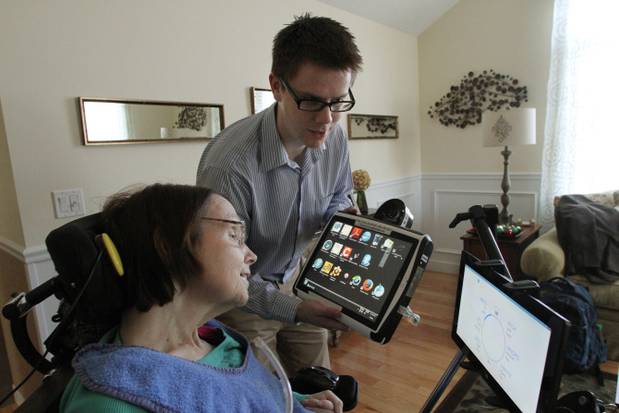Monday, January 06, 2014
Source: Providence Journal

PROVIDENCE — Dan Bacher has an easy, gentle manner as he intently watches Cathy Hutchinson’s head and eye movements for the subtle responses she offers as they communicate.
He has driven to the East Taunton, Mass., group home where Hutchinson lives to attach a new Windows computer tablet to her wheelchair and show her the software he and a team have developed for her. Since Hutchinson suffered a brain stem stroke in 1996 that left her body nearly motionless — but her mind alert — she has lived with a condition known as “locked-in syndrome.” For her, communicating is difficult and time-consuming, but she persists.
Bacher launched the nonprofit, SpeakYourMind Foundation Inc., last January to create better, less expensive communication tools for Hutchinson and people with degenerative neurological diseases.
He began SpeakYourMind while working as a research engineer at BrainGate, the collaboration between Brown University and a number of renowned academic institutions that has pioneered an experimental brain implant. The BrainGate team helps people with severe paralysis interact with computers and regain some movement.
Bacher, 29, still works at BrainGate part-time, but he’s focusing most of his efforts these days on developing SpeakYourMind. He’s collaborating with Brown students, who’ve helped him determine how to take the nonprofit to the next level.
“He’s a unique individual. … He relates to academics and the medical community and the patients and the students,” says Brendan McNally, associate director at Brown’s Business Entrepreneurship and Organizations program, who has connected those students with Bacher. “He’s exceptional. He’s got some of those God-given skills and qualities.”
Bacher said Providence is the ideal place to locate SpeakYourMind because it has the right mix of resources.
The Brown University Institute for Brain Science, for example, is conducting groundbreaking research with BrainGate. Engineering students from Brown and the University of Rhode Island are equipped to solve real-world problems. And, Bacher says, the Rhode Island School of Design offers an “amazing addition” to the world of assistive medical technology, which hasn’t relied much on design until now.
Plus, Bacher praises the local startup scene, including groups such as the Founders League and Betaspring, as well as the social-enterprise movement that’s working to develop nonprofit and for-profit entities seeking to solve world problems.
BrainGate drew Bacher to Rhode Island in 2009. After he earned a master’s degree in biomedical engineering from the University of Pittsburgh, he was working toward a Ph.D. there conducting research with monkeys to create technology that interfaces with the brain. But he abandoned that Ph.D. program for the opportunity to conduct research with people, instead, at BrainGate.
Dr. Leigh Hochberg — one of the BrainGate doctors, Bacher’s boss at Brown and a member of the SpeakYourMind board of directors — says he sees “great synergy” between BrainGate and SpeakYourMind. Like Bacher, Hochberg has seen the limitations of systems designed to help people communicate.
Regardless of whether people involved with BrainGate have been using inexpensive or expensive devices, Hochberg says nearly everyone expresses frustration that the equipment hasn’t worked, is unreliable, takes weeks to get fixed or doesn’t get repaired at all.
“They were more often in the closet, stacked up with other technologies that had failed, than actually being used,” Hochberg said. “And while that might be OK for a toaster, it’s not OK if it’s somebody’s primary method for communication.”
Both Hochberg and Bacher met Cathy Hutchinson through BrainGate, where she was one of the first participants in their clinical trials.
A computer chip implanted in her brain allowed her to move a robotic arm by thinking about doing so, pick up a coffee, move it toward her lips and sip the drink through a straw. Yet she struggled with her existing communications technology.
Watching her, Bacher says, is how the idea for SpeakYourMind was born.
He began crafting low-cost alternatives. He posted on Internet forums, seeking volunteers to help alter software to meet the needs of individuals. People responded and gave their time to help those in need.
At Hutchinson’s house on a recent morning, it took a few minutes for her to communicate her strongest need to Bacher. Finally, an email she had sent earlier arrived in his inbox: Could he contact the company that built her $10,000 communications device and ask them to fix it?
Of course, he told her, but instead, he was ready to remove that old computer from her wheelchair and give her the Windows tablet — which cost $800 — and teach her how the new communications software would work.
Relying on the tablet’s built-in camera to observe her ever-so-slight head movements, Hutchinson began using a “radial keyboard” that displays letters in groupings, like those on a telephone dial pad. As Hutchinson’s head moves, the computer’s cursor selects letter groups, and algorithms work to offer all the possible words she might be spelling out. Hutchinson then selects the correct word, sometimes before “typing” all the letters, so she can write her thoughts with the computer and communicate with someone in the room or via email.
It doesn’t work perfectly yet, but Bacher showed her how it functions, gave her time to practice, and took note of what worked and what didn’t.
“It’s still a little sensitive, huh?” Bacher asked as he watched her attempt to select letters. “You like it?”
Hutchinson, 60, welcomed The Providence Journal into her home to watch Bacher work with her. But she answered questions before the visit, in a short email she composed with her old communications software, a task that took 45 minutes.
“I’m excited about the future of sym,” she wrote, using an acronym for Bacher’s nonprofit. “I have faith in sym and I’m very optimistic about the help it will bring to so many.”
Bacher tells Hutchinson how much he likes the sticker she displays on her wheelchair: “My legs don’t work, but my brain does.”
View the original Providence Journal article.

indiegogo.com/projects/speakyourmind-foundation